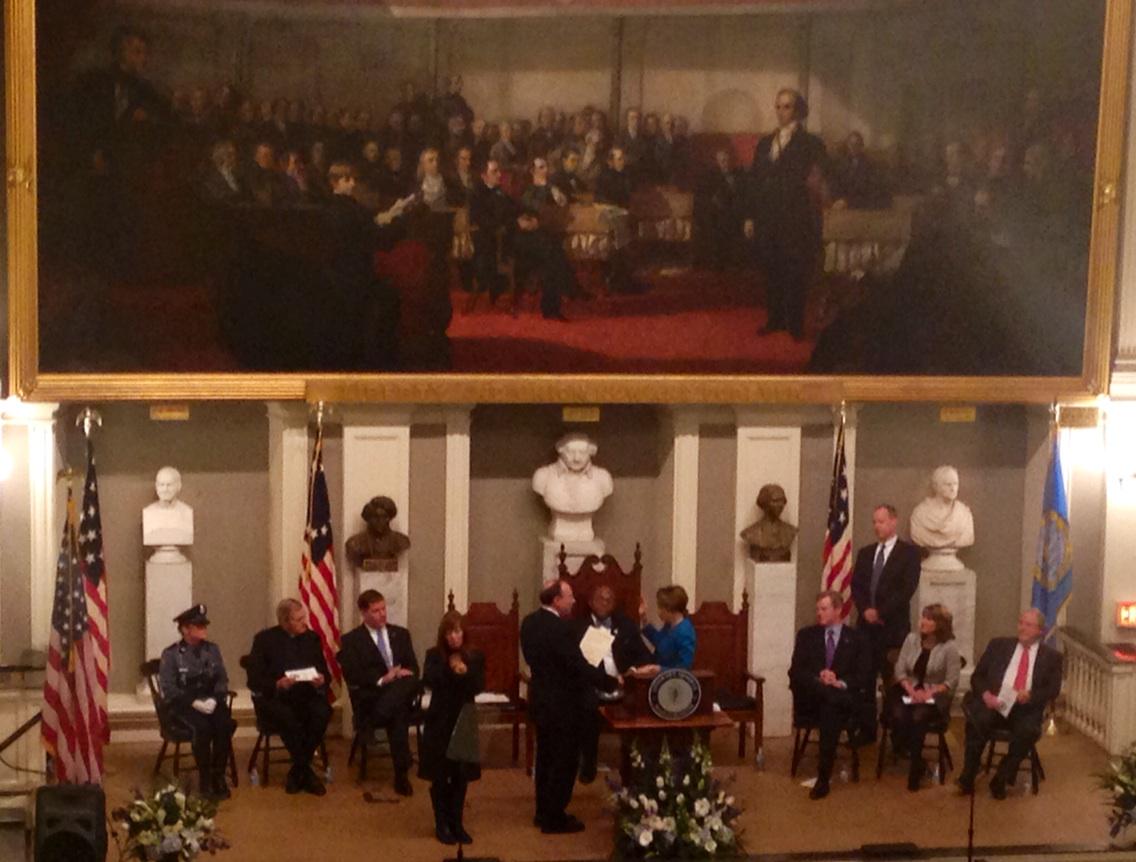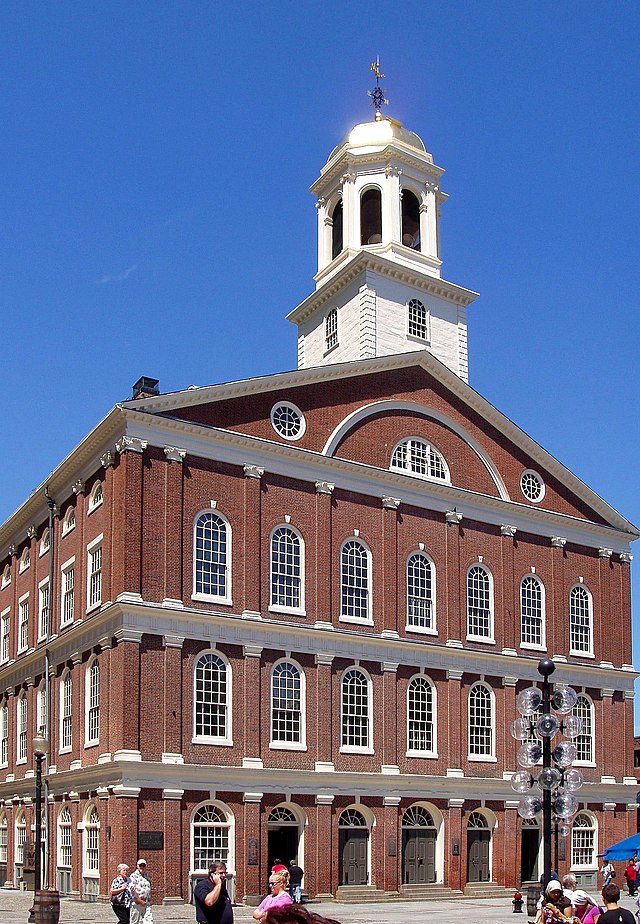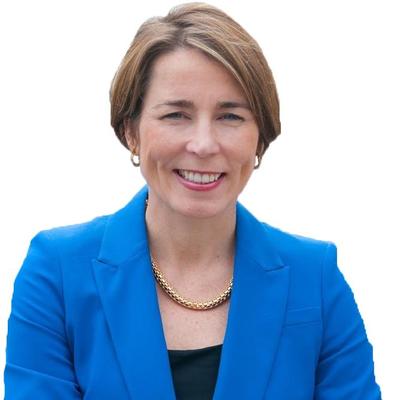Analysis: Healey, Champion to the People, Shrinking Violet to None…

Chief Justice of the SJC Ralph Gants swears in Maura Healey (via Twitter/@speakerdeleo)
BOSTON—As Supreme Judicial Court Chief Justice Ralph Gants administered the oath of office to Attorney General Maura Healey last Wednesday, among the hundreds in Faneuil Hall looking on were Lt Gov. Karyn Polito, Speaker Robert DeLeo, Mayor Marty Walsh, former US Senator Mo Cowan, and Gov. Charlie Baker. But peering over everything, adding to the symbolism, was another famous lawyer.
Above the stage hung Webster’s Reply to Hayne, a painting representing Senator Daniel Webster famous response to a colleague supporting the Union. Stripping away nullification, the subject of the depicted debate, Healey’s passionate promise to stand by her values no matter the foe echoed Webster’s.
Perhaps by accident if not design, everything about Healey’s swearing in seemed to underscore how she, like previous Massachusetts attorneys general would be a counterweight to a Republican governor. Unlike the treasurer, secretary of state, auditor or even the legislature, Healey was not sworn in by the governor, but by the head of the commonwealth’s highest court.

Normally avoided by locals due to throngs of tourists, Faneuil Hall was packed with politicos and legal eagles to witness Healey’s swearing-in. (via wikipedia)
Her speech drew on the history and significance of the room, away from Beacon Hill, and restated her plans as the commonwealth’s chief law enforcement officer.
“This is where we become Americans,” Healey, a Democrat, said. Faneuil Hall hosts naturalization ceremonies and a woman who recently received her citizenship was among those leading the Pledge of Allegiance. Faneuil Hall, Healey noted, is also where new lawyers are sworn into the bar.
In addition to Healey restating her campaign promises to take on heroin and opiate crisis and hold for-profit schools and casinos companies accountable, she committed to creating a division of community engagement to ensure the AG’s resources are accessible to—and utilized by—every segment of society.
While she pledged cooperation with the governor sitting nearby who had no formal role in the ceremony, Baker, too, was inescapably and implicitly being put on notice, too.

Gov. Charlie Baker (via Twitter/@massgovernor)
Make no mistake. Healey was NOT picking a fight with the governor. Yet the setting, the rhetoric and the symbolism underlined that while Healey extends to Baker a hand of cooperation, where they differ she will be unafraid to use the full powers of her office.
While the legislature can and ultimately will from time to time stymie Baker, Healey can act in the name of the commonwealth backed by one the best kinds of standing armies—lawyers. She swore in her assistant attorneys general shortly after she took the oath herself. They report to her, not the governor whom they will, from time to time, represent.

Healey campaigning with Martha Coakley last fall. While Healey has distanced herself from some of her ex-boss’s positions, the new attorney general has unabashedly thanked her predecessor. (via Facebook/Healey campaign)
As if Healey’s declaration of independence were not already apparent, in her speech she paid tribute to her former boss, Martha Coakley, also in attendance. Even in defeat, the woman Baker defeated, who hired Healey away from the private sector, loomed larger than the spectator-in-chief on stage. Underscoring this point, Healey won election by lopsided majorities, whereas Baker limped across the finish line by plurality.
It is not that Baker and Healey have nothing to agree about. However, even in their respective inaugural address, Healey went into far more detail, ambitiously laying out the agenda for her office, cognizant of the reach and limits of the office she held. In his, Baker emphasized his inoffensive, but nebulous promise of greatness for the commonwealth.
Baker’s early moves in office, principally with personnel, have already raised eyebrows, if among Democrats more than the press or the public generally. That could be politics, but if it is not, Baker will need Healey’s good will far more than she will need his.

Healey can access pathways through the sometimes Byzantine legislature that may be closed to Baker. (WMassP&I)
Healey can lobby the legislature and its veto-proof majority on her own to get what she needs and can do so without jeopardizing her independence—legal or political. The same may not be as simple for Baker, who has a rambunctious right-wing to sate (and/or sedate).
History suggests the public is more likely to side with her. Despite Bay Staters’ rejection of their AGs’ political ambitions, voters usually approve of the work attorneys general do. Meanwhile, the office itself has changed over time. During the 1980’s, the staff became more professionalized. Starting in 1990 a string of Middlesex County district attorneys were elected instead of non-practicing lawyer-politicians.
While DA’s are certainly politicians too, the public’s expectations of them differ from that of other pols. To tame a place as broad, diverse and disparate as Middlesex County, the best choice for a DA is to simply run the office fairly and well. Reasonably, the former Middlesex DA’s who became AG largely did this, paving a path to Ashburton Place.

Voters have responded positively to practicing attorneys’ pitch to lead the AG’s office since 1990, Healey being the latest example. (via Twitter/@massago)
Healey is the next logical step in the AG office’s professionalization. A former top deputy in the office leading several of its divisions, her argument that she had done the job arguably helped propel her from unknown to political rock star.
Baker, formerly an also-ran, decided to (or had to) play let’s make a deal to avoid a divisive primary, yielding an embarrassing convention. The primary ended up being only a speed bump, but still messy. Even in the general, grassroots energy did not elect him so much as plentiful support from the national GOP did.
No, Healey does not want to be a partisan impediment to Baker’s agenda (once it coalesces). The traffickers of drugs and guns, the unscrupulous for-profit colleges and the casino licensees with their fingers crossed take precedence.
“To all those who have lost a loved one to this epidemic: I stand with you,” Healey said of the opiate crisis, for example.
But whether her intention or not, Healey laid down the law. She will not warp her values to placate powerful interests or persons. More importantly, she has the fortitude and resources to maintain that commitment.
Watch and beware, your excellency.
Watch Healey’s entire speech above.
*WMassP&I Editor-in-Chief Matt Szafranski has organized events on behalf of Maura Healey’s candidacy and served as a whip for her during the state Democratic convention.